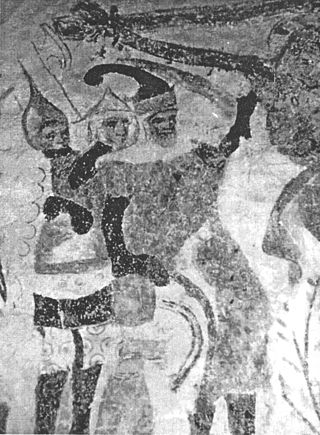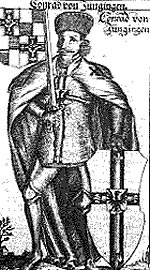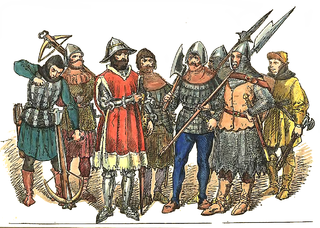
The Northern Crusades or Baltic Crusades were Christianization campaigns undertaken by Catholic Christian military orders and kingdoms, primarily against the pagan Baltic, Finnic and West Slavic peoples around the southern and eastern shores of the Baltic Sea, and also against Orthodox Christian East Slavs.

The Teutonic Order is a Catholic religious institution founded as a military society c. 1190 in Acre, Kingdom of Jerusalem. The Order of Brothers of the German House of Saint Mary in Jerusalem was formed to aid Christians on their pilgrimages to the Holy Land and to establish hospitals. Its members have commonly been known as the Teutonic Knights, having historically served as a crusading military order for supporting Catholic rule in the Holy Land and the Northern Crusades during the Middle Ages, as well as supplying military protection for Catholics in Eastern Europe.

The State of the Teutonic Order was a theocratic state located along the southeastern shore of the Baltic Sea in northern Europe. It was formed by the knights of the Teutonic Order during the early 13th century Northern Crusades in the region of Prussia. In 1237, the Livonian Brothers of the Sword merged with the Teutonic Order of Prussia and became known as its branch – the Livonian Order. At its greatest territorial extent during the early 15th century, the State encompassed Chełmno Land, Courland, Gotland, Livonia, Estonia, Neumark, Pomerelia, Prussia and Samogitia.

The Victual Brothers were a loosely organized guild of privateers who later turned to piracy. They affected maritime trade during the 14th century in both the North and Baltic Seas.

The Battle of Visby was fought in 1361 near the town of Visby on the island of Gotland, between the forces of the Danish king and the Gutnish country yeomen. The Danish force was victorious.

Konrad von Jungingen was a Grand Master of the Teutonic Order from 1393 to 1407. Under his administration, the Teutonic Order would reach its greatest extent.

Visborg (Wisborg) refers to a fortress in the town of Visby on the Swedish island of Gotland. Successive fortresses were built in Visby, though Visborg is usually in reference to the castle built here by King Eric of Denmark, Norway, and Sweden.

The Bishopric of Courland was the second smallest (4500 km2) ecclesiastical state in the Livonian Confederation founded in the aftermath of the Livonian Crusade. During the Livonian War in 1559 the bishopric became a possession of Denmark, and in 1585 sold by Denmark to Poland–Lithuania.

Polish–Teutonic Wars refer to a series of conflicts that took place between the Kingdom of Poland and the Teutonic Order, a medieval German military order with roots in the Baltic region. These wars occurred primarily during the 14th and 15th centuries and were characterized by territorial disputes, political maneuvering, and religious differences.
Invasion of Russia can refer to:

This is the 1454-1466 Polish-Teutonic War. For a list of all Polish-German Wars, see Polish-German Wars.
Conrad Letzkau was a councilman and later Mayor of Danzig who, together with Arnold Hecht, was assassinated by the Teutonic Knights.

Denmark and Germany are full members of NATO and of the European Union. The border between the countries, which lies in the Schleswig region, has changed several times through history, the present border was determined by referendums in 1920. The Danish-German border area has been named as a positive example for other border regions. Substantial minority populations live on both sides of the border, and cross-border cooperation activities are frequently initiated.

Eric I, Duke of Mecklenburg was the eldest son of Albert, King of Sweden and heir to the throne of Sweden. Eric played a significant role in his father's attempts to secure and reclaim the Swedish throne. Eric and Albert were defeated in battle of Åsle in 1389 and imprisoned by the Danish Queen Margaret I of Denmark. They were released in 1395 against a ransom guaranteed by the Hanseatic league.

Terra Mariana was the formal name for Medieval Livonia or Old Livonia. It was formed in the aftermath of the Livonian Crusade, and its territories were composed of present-day Estonia and Latvia. It was established on 2 February 1207, as a principality of the Holy Roman Empire, and lost this status in 1215 when Pope Innocent III proclaimed it as directly subject to the Holy See.
Dano-Swedish Wars are many wars between either Denmark or Denmark-Norway and Sweden.

The Invasion of Gotland was a Danish sea-borne invasion of the Swedish island of Gotland in the Baltic Sea, led by admiral Niels Juel during the Scanian War. The invasion took place from 28 April to 1 May 1676.
The War in Gotland (1403–1404) was a conflict between the Kalmar Union and the Teutonic Order. The war was a failure for Margaret, and the island stayed in Teutonic hands until they eventually sold the island in 1407.

The War in Gotland (1398), also called the Gotland campaign of the Teutonic Knights was an invasion to the island of Gotland in 1398 by the Teutonic Order.
This page is based on this
Wikipedia article Text is available under the
CC BY-SA 4.0 license; additional terms may apply.
Images, videos and audio are available under their respective licenses.












